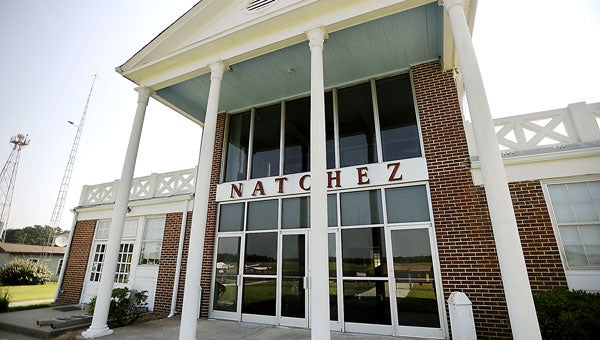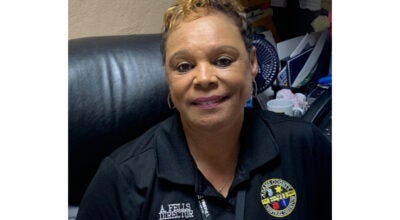Historic bridge to be donated to city for future Forks of Road site
Published 12:04 am Sunday, May 3, 2015

Overgrown grass and kudzu cover what remains of a brick bridge near the Forks of the Road property. The bridge will be donated to the City of Natchez on May 13 by the Charter Companies. (Ben Hillyer / The Natchez Democrat)
NATCHEZ — The majority of enslaved people arrived in Natchez in one of two ways, said Kathleen Jenkins, superintendent of the Natchez National Historical Park.
“They either came by steamboat up the river from New Orleans, or they were marched down the Natchez Trace,” she said.
For those slaves arriving from the Natchez Trace, one of the last things they would have done on their journey is walk down Old Washington Road and cross a bridge over the headwaters of Spanish Bayou.
When they crossed that bridge, the enslaved people would have arrived at Forks of the Road to be sold.
Chartre Companies, which built housing units on part of the Forks of the Road site, plans to donate a portion of land to the City of Natchez, which includes an old brick bridge.
Whether the brick bridge that exists at the site now is the actual bridge crossed by enslaved people making their journey to Forks of the Road isn’t known, Jenkins said.
“I would be shocked if it is the same bridge,” she said. “The fact that these people crossed some bridge at the headwaters of Spanish Bayou is what is historical. The brick bridge there now is covered in so much kudzu, no one has been able to determine its age or anything else about it.”
The city and Natchez National Historical Park officials plan a donation ceremony at 1:30 p.m., May 13. Clarence Chapman of Chartre Companies will turn over to the City of Natchez the deed for the historic brick bridge.
The ceremony will take place at the Forks of the Road interpretive area, located where Liberty Road meets St. Catherine Street. In the event of rain, the ceremony will be held at the Natchez Visitor Reception Center lobby.
Hope is the bridge will be donated eventually to the National Park Service, once Congress passes legislation authorizing the transfer.
“We are hoping for a good local turnout,” Jenkins said.
For more than a decade, Ser Seshsh Ab Heter-C.M. Boxley and his Friends of Forks of the Road Society have worked to raise awareness of that site and ensure its preservation.
“Because of his efforts, in 2005, U.S. Sen. Thad Cochran set aside money that was used to determine whether the Forks of the Road meets the criteria to be added to the Natchez National Historical Park,” Jenkins said. “And it was found that it does meet that criteria.”
The area defined as Forks of the Road encompasses about 18 acres, she said.
“It’s a hodge podge, really. The slave traders would basically rent a building, sell the slaves and go on their way. This happened up and down the site,” Jenkins said. “The city owns once piece of land right now, where the current interpretive markers are located. That area is considered ground zero.”
First Natchez Radio Group owns a portion of the site that is considered Forks of the Road. Another portion of the former site is now public housing. And some private businesses are located on the site, Jenkins said.
She and others have worked with the legislative affairs service of the National Park Service in Washington, D.C., to draft legislation that would allow the Natchez National Historical Park to own land within the area defined as Forks of the Road.
“That doesn’t mean any of the owners of the land have to sell or give the land to us. It would just mean that it’s legal for us to accept it,” she said. “The City of Natchez has made it very clear that, when the needed legislation gets approved, they will donate the land to the Natchez National Historical Park.”
However, that legislation has not been introduced in Congress.
As for when the legislation could go before Congress, Jenkins said, “Different things happen at different paces.”
Taking far too long
Boxley said he is disappointed that it has taken and continues to take so long to make progress on preserving and interpreting what he thinks is one of the most significant historical sites in Natchez and Mississippi, if not all of the country.
“This is a project that is needed for equal commemoration of history in this region. It speaks to America’s domestic slave trade. It speaks to the wealth that was generated on the backs of slaves that is reflected in the grand homes in Natchez,” he said.
Boxley said he has had no part in the deal for Chartres Companies to donate the bridge property to the city.
“I was not a part of that action in terms of the city making a deal or the park service encouraging a deal, because I’m opposed to the whole housing development,” he said. “It desecrates the sacred grounds where thousands of our ancestors were sold and had their lives stolen from them to help make cotton king in this region.”
Boxley said he is not an advocate of tourism. However, he said he continues to hear experts away from Natchez remark about how valuable an asset or way to enhance tourism the Forks of the Road site is to Natchez and its future tourism.
“Many thousands walked millions of steps in chains from Maryland, the Carolinas, Kentucky and Tennessee and crossed Spanish Bayou to be sold. That’s the history at that juncture. Those are the facts. It’s testimony to the time when many thousands were forced in chains and sold to plantations and other sources in the Miss-Lou. The Forks of the Road is a golden opportunity for Natchez and Mississippi to come into the modern world and talk about and reveal the history of slavery,” Boxley said.





